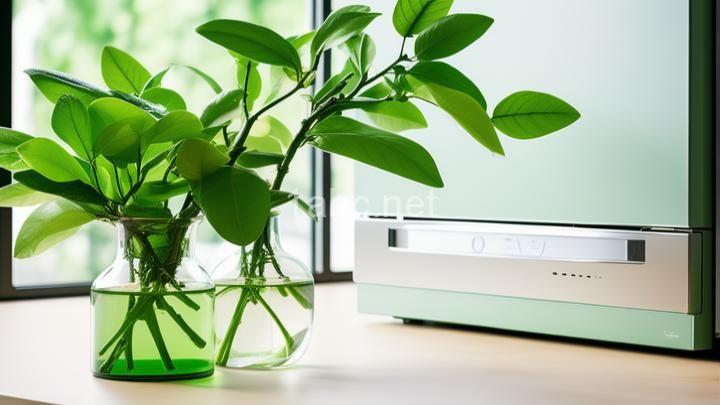Maximizing Energy Efficiency: Tips for Maintaining Your Appliances
Introduction:
I. Understanding Energy Efficiency:
II. Tips for Maintaining Energy Efficiency in Appliances:
1. Cleaning and Defrosting:
2. Temperature Settings:
1. Proper Loading Techniques:
2. Maintenance Practices:
1. Pre-rinsing Dishes:
2. Efficient Use of Settings:
III. General Appliance Maintenance Tips for Energy Efficiency:
Conclusion:

Introduction:
Are you tired of skyrocketing utility bills and concerned about the environmental impact of your energy consumption? Well, you're in luck! In this blog post, we will delve into the world of energy efficiency and provide you with some valuable tips on maintaining your appliances. By following these simple yet effective strategies, you can not only save money but also contribute to a greener and more sustainable future.
I. Understanding Energy Efficiency:
Before we jump into the nitty-gritty of appliance maintenance, let's take a moment to understand what energy efficiency really means. Energy efficiency is all about minimizing energy waste by using appliances and systems that consume less power to perform their functions. By opting for energy-efficient appliances, you can reduce your carbon footprint, conserve natural resources, and slash those pesky utility bills.
II. Tips for Maintaining Energy Efficiency in Appliances:
A. Refrigerator:
1. Cleaning and Defrosting:
Your refrigerator works tirelessly day in and day out to keep your food fresh and cool. However, over time, dust and debris can accumulate on the coils, condenser fan, and gaskets, hampering its efficiency. Regular cleaning and defrosting are crucial to keep your refrigerator running smoothly. To clean the coils, simply unplug the refrigerator and gently brush off the dust using a soft brush or vacuum cleaner. Cleaning the condenser fan and gaskets with a mild detergent solution can also work wonders.
2. Temperature Settings:
Believe it or not, the temperature settings of your refrigerator can significantly impact its energy consumption. The ideal temperature range for the refrigerator compartment is between 35 and 38 degrees Fahrenheit (1.7 to 3.3 degrees Celsius). For the freezer compartment, aim for a temperature of 0 degrees Fahrenheit (-17.8 degrees Celsius). Investing in a refrigerator thermometer can help you monitor and maintain these optimal temperature settings.
B. Washing Machine:
1. Proper Loading Techniques:
When it comes to your washing machine, proper loading techniques are key to maximizing energy efficiency. Overloading your machine can strain its motor and decrease its efficiency. On the other hand, underloading wastes energy by using excessive amounts of water and detergent. To strike the perfect balance, fill the machine to about 75% of its capacity. This way, you can ensure efficient water and energy usage during each wash cycle.
2. Maintenance Practices:
To keep your washing machine in tip-top shape, regular maintenance is essential. Cleaning the filters on a monthly basis prevents clogs and ensures optimal water flow. Additionally, don't forget to clean the detergent dispenser and drum periodically. A mixture of vinegar and water can work wonders in removing any built-up residue or odors.
C. Dishwasher:
1. Pre-rinsing Dishes:
Contrary to popular belief, pre-rinsing your dishes before loading them into the dishwasher is not necessary. In fact, it can lead to wasteful water and energy consumption. Instead, simply scrape off excess food from your plates and bowls. Modern dishwashers are designed to handle these small food particles, allowing you to save both water and energy.
2. Efficient Use of Settings:
When using your dishwasher, opt for eco-friendly settings whenever possible. These settings are specifically designed to reduce water consumption while still maintaining impeccable cleanliness. By choosing these settings, you can make a significant impact on your household's energy efficiency.
III. General Appliance Maintenance Tips for Energy Efficiency:
While we've covered some specific tips for refrigerator, washing machine, and dishwasher maintenance, it's important to remember that routine maintenance is crucial for all appliances. Here are a few general tips to keep in mind:
-
Check seals: The seals on your appliances, such as the refrigerator door gaskets and dishwasher door seal, play a vital role in maintaining energy efficiency. Inspect them regularly for any signs of wear or damage and replace them promptly if needed.
-
Inspect cords: Frayed or damaged cords can not only pose a safety hazard but also lead to energy wastage. Ensure that all cords are in good condition and replace any damaged ones immediately.
-
Replace worn-out parts: If you notice any worn-out parts in your appliances, such as dishwasher spray arms or refrigerator door handles, don't put off replacing them. These small repairs can go a long way in maintaining optimal energy efficiency.
Conclusion:
Congratulations! You're now armed with a treasure trove of knowledge on maximizing energy efficiency through appliance maintenance. By following these tips, you can not only save money on your utility bills but also contribute to a more sustainable future. So go ahead and put these strategies into action. And remember, even small changes can make a big difference. Together, let's create a greener and more energy-efficient world!
If you have any questions or want to share your own energy-saving experiences, we'd love to hear from you in the comments section below.
FREQUENTLY ASKED QUESTIONS
How can I maximize energy efficiency in my home?
Maximizing energy efficiency in your home is a great way to save money and reduce your environmental impact. Here are some tips to help you achieve that:
-
Improve insulation: Insulate your walls, attic, and windows to prevent drafts and keep your home thermally efficient.
-
Upgrade to LED lighting: Replace traditional incandescent bulbs with energy-efficient LED lights, which consume less electricity and last longer.
-
Install a programmable thermostat: Use a programmable thermostat to regulate your home's temperature and reduce energy consumption when you're not at home.
-
Seal air leaks: Identify and seal any air leaks around windows, doors, and other areas where conditioned air might escape or unconditioned air might enter.
-
Use energy-efficient appliances: Choose appliances with Energy Star labels, as they are designed to consume less energy.
-
Optimize heating and cooling: Clean or replace air filters regularly, maintain your HVAC system, and consider upgrading to more energy-efficient models.
-
Unplug electronics when not in use: Many devices continue to draw power even when they're turned off. Unplugging them or using power strips with switches can help eliminate this "phantom load."
-
Utilize natural lighting: Make use of natural light during the day through windows and skylights to minimize the need for artificial lighting.
-
Reduce water usage: Install efficient faucets, showerheads, and toilets to conserve water and energy used for heating water.
-
Consider renewable energy sources: If feasible, explore options like solar panels or wind turbines to generate clean, renewable energy for your home.
Implementing these energy-saving practices will not only help you reduce your utility bills but also contribute to a more sustainable future.
How often should I clean my appliances?
It is generally recommended to clean household appliances on a regular basis to ensure their optimal performance and prolong their lifespan. Here are some guidelines for how often you should clean common appliances:
-
Refrigerator: Clean the interior of your refrigerator every 3-4 months. Wipe down shelves, drawers, and walls with a mild detergent mixed with water. Also, vacuum the condenser coils at the back of the fridge at least twice a year.
-
Oven: A self-cleaning oven should be cleaned according to the manufacturer's instructions. For regular ovens, it is recommended to clean them thoroughly every 3-6 months, depending on usage. You can use a commercial oven cleaner or a mixture of baking soda and water.
-
Dishwasher: Clean the interior of your dishwasher once a month to remove any buildup or odors. Use a dishwasher cleaner or run an empty cycle with a cup of vinegar placed on the top rack.
-
Washing machine: To prevent mold and mildew, clean the washing machine drum every 1-3 months. Use a washing machine cleaner or run a hot water cycle with vinegar or bleach.
-
Dryer: Clean the lint trap after each load and check the dryer vent for lint buildup at least once a year. A clogged dryer vent can be a fire hazard, so regular maintenance is crucial.
Remember to always refer to the appliance's manual for specific cleaning instructions and precautions.
How can I clean my appliances effectively?
To effectively clean your appliances, follow these steps:
-
Read the manufacturer's instructions: Check the user manual or instructions provided by the manufacturer for specific cleaning guidance.
-
Unplug the appliance: Before cleaning any electrical appliance, make sure to unplug it to avoid any accidents.
-
Use appropriate cleaning solutions: Use mild detergents, non-abrasive cleaners, or specific appliance cleaners recommended by the manufacturer. Avoid using harsh chemicals that may damage the appliance.
-
Remove detachable parts: If possible, remove detachable parts such as shelves, trays, or racks and wash them separately. Soak them in warm soapy water, scrub them gently, and rinse them thoroughly before drying and reassembling.
-
Wipe down the exterior: Use a damp cloth or sponge to wipe down the exterior surfaces of the appliance. For stainless steel surfaces, use a stainless steel cleaner or a mixture of warm water and mild dish soap. Dry the surfaces with a clean cloth to prevent water spots.
-
Clean the interior: For the interior of appliances, such as ovens, microwaves, or refrigerators, follow the manufacturer's instructions. Use a suitable cleaner or a mixture of warm water and baking soda to remove stains and odors. Avoid using abrasive materials that could scratch the surfaces.
-
Pay attention to details: Clean hard-to-reach areas like knobs, buttons, and crevices using a soft brush or a toothbrush. Use cotton swabs dipped in cleaning solution to clean narrow spaces and vents.
-
Rinse and dry: Once you have cleaned all the surfaces, make sure to rinse off any cleaning solution residue. Wipe the appliance dry with a soft cloth or allow it to air dry completely before plugging it back in.
Remember to always prioritize safety, refer to the appliance's manual, and follow the manufacturer's recommendations for cleaning and maintenance to ensure optimal performance and prolong the life of your appliances.
What should I do if my appliances are not working efficiently?
If your appliances are not working efficiently, here are a few steps you can take:
-
Check for power issues: Ensure that the appliance is properly connected to a power source and that the power supply is stable. If necessary, try plugging the appliance into a different outlet or resetting the circuit breaker.
-
Clean or replace filters: Many appliances, such as air conditioners or vacuum cleaners, have filters that can become clogged with dirt and debris over time. Cleaning or replacing these filters can improve the efficiency of the appliance.
-
Clean the appliance: Dust and dirt buildup can hinder the performance of appliances. Regularly clean the exterior and interior components of your appliances to remove any accumulated dirt, dust, or lint.
-
Ensure proper ventilation: Appliances that generate heat, such as refrigerators, ovens, or dryers, need proper ventilation to work efficiently. Make sure that there is adequate space around the appliance for air to flow and that vents are not blocked.
-
Schedule maintenance: Consider scheduling regular maintenance for your appliances. Professional servicing can help identify and fix any underlying issues that may be causing inefficiency.
Remember, if none of these steps improve the efficiency of your appliances, it may be worth contacting a professional repair service or the manufacturer for further assistance.


